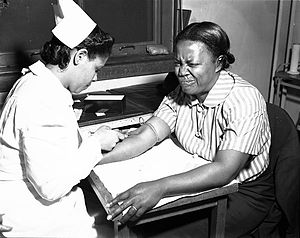Nociceptive pain
| Pain | |
|---|---|
 |
|
| A woman grimacing while having blood drawn | |
| Classification and external resources | |
| Specialty | Neurology |
| ICD-10 | R52 |
| ICD-9-CM | 338 |
| DiseasesDB | 9503 |
| MedlinePlus | 002164 |
| MeSH | D010146 |
Pain is a distressing feeling often caused by intense or damaging stimuli, such as stubbing a toe, burning a finger, putting alcohol on a cut, or bumping the "funny bone". Because it is a complex, subjective phenomenon, defining pain has been a challenge. The International Association for the Study of Pain's widely used definition states: "Pain is an unpleasant sensory and emotional experience associated with actual or potential tissue damage, or described in terms of such damage." In medical diagnosis, pain is regarded as a symptom of an underlying condition.
Pain motivates the individual to withdraw from damaging situations, to protect a damaged body part while it heals, and to avoid similar experiences in the future. Most pain resolves once the noxious stimulus is removed and the body has healed, but it may persist despite removal of the stimulus and apparent healing of the body. Sometimes pain arises in the absence of any detectable stimulus, damage or disease.
Pain is the most common reason for physician consultation in most developed countries. It is a major symptom in many medical conditions, and can interfere with a person's quality of life and general functioning. Simple pain medications are useful in 20% to 70% of cases. Psychological factors such as social support, hypnotic suggestion, excitement, or distraction can significantly affect pain's intensity or unpleasantness. In some arguments put forth in physician-assisted suicide or euthanasia debates, pain has been used as an argument to permit people who are terminally ill to end their lives.
One judgment on the value of pain is given by German philosopher, Friedrich Nietzsche, who wrote: "Only great pain is the ultimate liberator of the spirit….I doubt that such pain makes us ‘better’; but I know that it makes us more profound”. Nietzsche and philosophers influenced by him thus oppose the entirely negative valuation of pain, instead holding that 'What does not destroy me, makes me stronger."
In 1994, responding to the need for a more useful system for describing chronic pain, the International Association for the Study of Pain (IASP) classified pain according to specific characteristics:
...
Wikipedia
